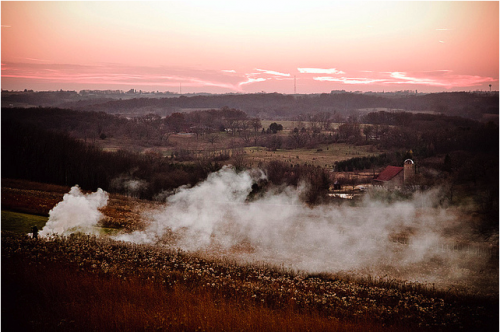It is burn season here in New England and I have to admit that I never thought much about its possible implications until I started writing this blog. I have over the last couple years received numerous backlash comments against fire of any type in the garden and because of it I have recently found myself being a bit more cautious in what I say on this site, as related to fire.
It’s not so much that I am fearful of stirring the pot on a topic, but I have been questioning myself and wondering if by burning, I and my neighbors across new England (and elsewhere too) have been committing horrible environmental atrocities. Certainly this is not our intention. Rather, as owners of land that is largely forested, it has always seemed a necessity to clean up and prepare for a new season and this is the most natural way.

image by jw_creations
This post is by no means meant to present the full argument for or against the use of controlled burning in the landscape, nor to discuss garden fire accents of any sort, but it is (hopefully) a means to keep us all thinking. I wanted to share this link to the Nature conservancy. I tend to trust the Nature Conservancy and what they have to say. So this answer (Are prescribed burns good or bad for Carbon storage?) on their ‘Ask the Conservationist’ feature has me feeling a lot better about managing my property the same way that my neighbors do….with burning in the spring.
I haven’t yet been able to burn this year, Everything is simply too wet and snowy. But the season goes through May 1st, so I am hoping that since I can now officially see patches of grass out the window, things will soon dry enough to get underway. I love burn season, it is a warm way to break the winter blues. I always feel the refreshing sense of spring cleaning (which is not something that I think nature necessarily requires – but I do) and it is for me a rite of spring that feels nurturing to the land….and I am so glad that I have read this article, because I now know that not only does it feel nurturing but it actually is.
Carbon storage is only a part of the picture.
One thing we are really good at is isolating one thing in a system and studying it to bits. We get a pretty good idea of that one thing – not so much a great view of the whole situation.
our family has several members with lung diseases/conditions … NOT due to smoking … so, we are vigilant about keeping smoke and other air pollutants OUT of our home … which is VERY difficult to do … it may be “easier” for us to understand the difficulty Earth has with “green house gases” – we have often wondered how many acres of natural/wild fires would have to burn to equal the tons of man-made exhaust … perhaps the gardener burning vegetation could make a trade-off – don’t use the car that day – cook dinner outside over the embers collected in a special area (beware some plants release smoke that is TOXIC) – or just imagine what it would like to have a breathing problem (drowning on the bottom of a pool with an elephant sitting on your chest)
PS – we can’t go fishing – we know how that fish is suffering as he gasps for air, writhing in torture until death comes as a welcome release.
Really simple:
Oxidization + years vs rapid Oxidization. Same end result.
I personally miss the smell of burning leaves.
Think about it in terms of volume, where is the greater hit- masses of persons burning in the yard occasionally vs factories that are not tightly controlled?
Example- one trip to China will enlighten your lungs.
Native americans brought the technology to North America when they came. This is HUGELY a human decision.
Not a political comment, though. Have you considered just posting this entire thing right on their Facebook Wall?
I made a smarmy reminder to one of their “managed” oil-producing properties in the south, where the prairie chicken was looking at extinction, and they backpedaled,etc.